Juho Pohjalainen's Blog: Pankarp, page 7
July 1, 2019
An example of my rules of magic, with Wyla Prenward
My this year's summer project is a story about magic, and wizards, and witchcraft, and a whole lot of such things. It ended up spawning all those dry long blog posts about magical rules and how I thought things should be done - I just had to get the assorted ideas down somewhere, I guess. So I think it'd be just appropriate to carry on with the theme and also fish a practical example out of the story.

Wyla Prenward, aged fourteen, lives on a farm in Hightower with her brothers and sisters, six of them older than her, and then aunts and uncles, six of them from her mother's side. This is probably why she can talk to birds - with a bit of awkward consequences, on account of a lot of that stuff being unsuitable for a toddler's ears. Then over the coming years she picks up more witchcraft, almost entirely related to farm work - on the insistence of her mother, who isn't very happy about this stuff in general. It was neither from books, like with Melker, nor by selling her soul or making deals with evil things, like with Rime: she just lives her life, tries to figure things out, and the world around her will give her the answers. She's got talent: magic is in her blood.
So she knows how to plant and harvest stuff, how to fix broken things, how to tell weather, how to take care of animals, how to butcher them for meat, cooking, sewing, milling, and all other such things. She actually has absolutely no idea how to do most of these without magic: she just casts the spells, sings the songs and does the handiwork, and her heart will tell her what to do. It's basically shortcuts, and the very subtle sort: if you're not paying attention, you could well imagine that no magic is used at all, and that she's just really good at this stuff. But she's yet unsatisfied, and always on the lookout for more magic, more power, more fame.
That's rules one and four, in case you weren't counting.
Rule two - she's the only witch anyone around the area knows about, and the only fantastic fairytale element for that matter. She's discontent because her family - according to her at least - takes her skill for granted and aren't showering her in enough praise; and the folk of a nearby village just think she's the child of a demon or some shit and would be happy to see her gone forever. None of them really understand her, she feels. As such she is driven to step beyond the borders, to the fantastic and the unknown, where she discovers a whole new world of magic and adventure. That's when it gets weird for her.
And the rule three? Oh, that doesn't seem like much for her: all she thinks it does, the magic, is make her a little tired. She basically equates it to a quick jog around the woods or something else exhausting but satisfying. And for that matter, she's firmly on the opinion that there's no reason to not use magic to solve a problem if you can: why do something the boring and inadequate mundane way, when a little bit of sorcery will deal with it faster and more convenient?
She will know better by the end of this.
Oh, and Peal is there too. You can see him in the picture above as well, after all. This entire adventure takes place a good thirty years after The Straggler's Mask: by this time he's fully become a part of the land of adventure, the very opposite of mundane. He's basically there to make sure Wyla doesn't get into too much trouble.
He will fail.
Also, a couple talking bird buddies. The fowl in her hands is named Acapon. Think about that for a moment.
On the whole, I have a fairly good feeling about this story. There's a girl with too much magic and too little maturity, a realm of adventure and fantasy outside the world of the known, a mentor, and a whole bucketful of harsh lessons to come. We'll see if she can keep up with that cheerful smile of hers.
(Picture credit: Rebecca Tasic)

Wyla Prenward, aged fourteen, lives on a farm in Hightower with her brothers and sisters, six of them older than her, and then aunts and uncles, six of them from her mother's side. This is probably why she can talk to birds - with a bit of awkward consequences, on account of a lot of that stuff being unsuitable for a toddler's ears. Then over the coming years she picks up more witchcraft, almost entirely related to farm work - on the insistence of her mother, who isn't very happy about this stuff in general. It was neither from books, like with Melker, nor by selling her soul or making deals with evil things, like with Rime: she just lives her life, tries to figure things out, and the world around her will give her the answers. She's got talent: magic is in her blood.
So she knows how to plant and harvest stuff, how to fix broken things, how to tell weather, how to take care of animals, how to butcher them for meat, cooking, sewing, milling, and all other such things. She actually has absolutely no idea how to do most of these without magic: she just casts the spells, sings the songs and does the handiwork, and her heart will tell her what to do. It's basically shortcuts, and the very subtle sort: if you're not paying attention, you could well imagine that no magic is used at all, and that she's just really good at this stuff. But she's yet unsatisfied, and always on the lookout for more magic, more power, more fame.
That's rules one and four, in case you weren't counting.
Rule two - she's the only witch anyone around the area knows about, and the only fantastic fairytale element for that matter. She's discontent because her family - according to her at least - takes her skill for granted and aren't showering her in enough praise; and the folk of a nearby village just think she's the child of a demon or some shit and would be happy to see her gone forever. None of them really understand her, she feels. As such she is driven to step beyond the borders, to the fantastic and the unknown, where she discovers a whole new world of magic and adventure. That's when it gets weird for her.
And the rule three? Oh, that doesn't seem like much for her: all she thinks it does, the magic, is make her a little tired. She basically equates it to a quick jog around the woods or something else exhausting but satisfying. And for that matter, she's firmly on the opinion that there's no reason to not use magic to solve a problem if you can: why do something the boring and inadequate mundane way, when a little bit of sorcery will deal with it faster and more convenient?
She will know better by the end of this.
Oh, and Peal is there too. You can see him in the picture above as well, after all. This entire adventure takes place a good thirty years after The Straggler's Mask: by this time he's fully become a part of the land of adventure, the very opposite of mundane. He's basically there to make sure Wyla doesn't get into too much trouble.
He will fail.
Also, a couple talking bird buddies. The fowl in her hands is named Acapon. Think about that for a moment.
On the whole, I have a fairly good feeling about this story. There's a girl with too much magic and too little maturity, a realm of adventure and fantasy outside the world of the known, a mentor, and a whole bucketful of harsh lessons to come. We'll see if she can keep up with that cheerful smile of hers.
(Picture credit: Rebecca Tasic)
Published on July 01, 2019 14:57
•
Tags:
birds, farming, magic, magic-systems, peal, rules, wizards, wyla-prenward
June 28, 2019
Rule Number Four of Magic: Drop the Special Effects!
We've more or less got the principles of magic and fantasy down now, their role in the setting and the narrative, but it's still important to consider aesthetics as well. And I've always found that a lot of the magic, especially in the modern day, might really want to consider that "Less is More".
I mean, nine times out of ten, when I search artwork about wizards casting spells, I get shit like this:

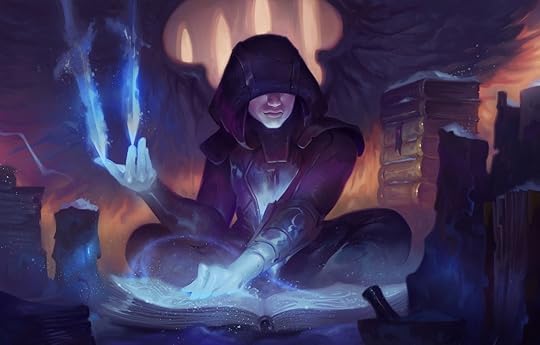


I get that this is a visual medium, and that oftentimes it's difficult to get across what is happening, especially in still images. You'll think that having no effects at all would make it too ambiguous what's going on, or the whole thing would seem boring, or all the power and majesty of sorcery might not come across.
I wholeheartedly disagree. I think that turning wizards into walking fireworks dispensers is what kills the magic quickly, not the opposite. The actual power of magic, the subtlety of true and terrifying witchcraft, drowns under the lightshow.
Witness an example of the opposite - the very first use of Force in cinema history:

Vader doesn't give a single fuck here. You can see exactly what's going on, what he's doing, and just what the implications of this thing are. Your faith will not be lacking afterwards.
And yet even this was ruined later on. For some reason I can't begin to comprehend, virtually every time someone's force-choked in comics or video games, the victim also levitates off the ground a bit. Sometimes the choke itself gets special effects, like here.

Why? What purpose does any of this carry? What does it add to the scene, or to the story? How does it make the magic (or Force, in this case) seem any scarier or more imposing than it used to be? Or is it about the whole thing being unclear - was Vader being too ambiguous earlier?
And yes, this sort of magic-use has crept along into literature as well - I probably wouldn't be talking about it here otherwise. Flashy lightshow wizards abound in books, even though they're not a visual medium at all and you'd think they could come up with better ways to describe it all. Alas.
I continue to not getting it, so up until someone clearly and concisely explains to me why virtually everyone is doing this shit, changing my mind in the most enlightening and dramatic way, my wizards will continue to be subtle. All magic use will come with the bare minimum of special effects: fireballs will burn, a blinding flash will of course be bright as hell, but there will be no blue lights or whatever surrounding the wizard as he casts.
He's not here to be flashy. He's here to get shit done with magic.

And that's the rules of magic more or less down, as I see them, barring if I come up with something else later that I forgot or neglected to address so far. It doesn't feel like there'd be much else left to discuss, though. But I've been wrong before.
Next time I'll talk about all this in practice: I've been writing a highly magical story lately, and I think it'll make for some good examples here.
I mean, nine times out of ten, when I search artwork about wizards casting spells, I get shit like this:




I get that this is a visual medium, and that oftentimes it's difficult to get across what is happening, especially in still images. You'll think that having no effects at all would make it too ambiguous what's going on, or the whole thing would seem boring, or all the power and majesty of sorcery might not come across.
I wholeheartedly disagree. I think that turning wizards into walking fireworks dispensers is what kills the magic quickly, not the opposite. The actual power of magic, the subtlety of true and terrifying witchcraft, drowns under the lightshow.
Witness an example of the opposite - the very first use of Force in cinema history:

Vader doesn't give a single fuck here. You can see exactly what's going on, what he's doing, and just what the implications of this thing are. Your faith will not be lacking afterwards.
And yet even this was ruined later on. For some reason I can't begin to comprehend, virtually every time someone's force-choked in comics or video games, the victim also levitates off the ground a bit. Sometimes the choke itself gets special effects, like here.

Why? What purpose does any of this carry? What does it add to the scene, or to the story? How does it make the magic (or Force, in this case) seem any scarier or more imposing than it used to be? Or is it about the whole thing being unclear - was Vader being too ambiguous earlier?
And yes, this sort of magic-use has crept along into literature as well - I probably wouldn't be talking about it here otherwise. Flashy lightshow wizards abound in books, even though they're not a visual medium at all and you'd think they could come up with better ways to describe it all. Alas.
I continue to not getting it, so up until someone clearly and concisely explains to me why virtually everyone is doing this shit, changing my mind in the most enlightening and dramatic way, my wizards will continue to be subtle. All magic use will come with the bare minimum of special effects: fireballs will burn, a blinding flash will of course be bright as hell, but there will be no blue lights or whatever surrounding the wizard as he casts.
He's not here to be flashy. He's here to get shit done with magic.

And that's the rules of magic more or less down, as I see them, barring if I come up with something else later that I forgot or neglected to address so far. It doesn't feel like there'd be much else left to discuss, though. But I've been wrong before.
Next time I'll talk about all this in practice: I've been writing a highly magical story lately, and I think it'll make for some good examples here.
Published on June 28, 2019 11:44
•
Tags:
disappearing-underpants, force-choke, magic, magic-systems, special-effects, subtlety, wizards
June 25, 2019
Rule Number Three of Magic: But At What Cost?
Magic is not free. Wizards cannot just fling their spells around infinitely, all day long. Otherwise the whole concept would soon lose its luster and wonder, render it an easy solution to everything and every time, and either nerf it to little firebolts and other simple replacements to the mundane, or make non-wizards sad.

Maybe they need to lug their thick heavy spellbooks around, flipping through them at a critical juncture to find what they need - and of course having to protect them from being stolen or harmed. Or they need to memorize their spells, and their poor little mortal skulls can only hold so many, putting a hard limit on how many they can cast before rest. Or they need some expensive material components or fuel - even live sacrifice, or the wizard's youth. Or they require complex maintained pacts and deals with things from some other realms. Or keeping an eye on the stars or something. Or maybe it tires them out, like physical exercise would, as the magic runs through their bodies.
Or maybe the magic is wild and uncontrolled, risking chaotic side-effects and wild surges if the wizard mucks them up under pressure, has no idea what he's doing, or is just really unlucky?

I like to mix and match all of these freely, and then any others I might come up with. It depends more on the spell in question, and the wizard casting it (as said in Rule One, the wizard makes the difference, not the world).
Melker prefers the Vancian way, stuffing all his spells into his mind and setting them loose when he needs them: his big brain can fit in a lot of magic, and whenever he does need to cast something he can do it without much further complication. Rime by contrast tends to either tire herself out, needs all those demonic pacts to have something to summon, or her spell just might go really wild at an inopportune moment. And both of them often require material components.
Both of them have gone through hell and high water to learn their craft even this well. If you try to do something half-assed, it will almost assuredly go terribly wrong. But that's more of a Rule Four thing.


Maybe they need to lug their thick heavy spellbooks around, flipping through them at a critical juncture to find what they need - and of course having to protect them from being stolen or harmed. Or they need to memorize their spells, and their poor little mortal skulls can only hold so many, putting a hard limit on how many they can cast before rest. Or they need some expensive material components or fuel - even live sacrifice, or the wizard's youth. Or they require complex maintained pacts and deals with things from some other realms. Or keeping an eye on the stars or something. Or maybe it tires them out, like physical exercise would, as the magic runs through their bodies.
Or maybe the magic is wild and uncontrolled, risking chaotic side-effects and wild surges if the wizard mucks them up under pressure, has no idea what he's doing, or is just really unlucky?

I like to mix and match all of these freely, and then any others I might come up with. It depends more on the spell in question, and the wizard casting it (as said in Rule One, the wizard makes the difference, not the world).
Melker prefers the Vancian way, stuffing all his spells into his mind and setting them loose when he needs them: his big brain can fit in a lot of magic, and whenever he does need to cast something he can do it without much further complication. Rime by contrast tends to either tire herself out, needs all those demonic pacts to have something to summon, or her spell just might go really wild at an inopportune moment. And both of them often require material components.
Both of them have gone through hell and high water to learn their craft even this well. If you try to do something half-assed, it will almost assuredly go terribly wrong. But that's more of a Rule Four thing.

Published on June 25, 2019 14:04
•
Tags:
cost, equivalent-exchange, limitations, magic, magic-systems, vancian-magic, wild-magic, wizards
June 20, 2019
Rule Number Two of Magic: Plenty Magic, Few Wizards
A human mind has always longed to make sense of things - to understand, to quantify, and to bind and take advantage of... or to get rid of what cannot be understood, to destroy or subjugate that which we fear.

For the last generation or so, this sort of thinking has been in vogue in fantasy as well. We now have great many stories where magic is fully understood, wizardry is a common and accepted profession, and fantasy creatures and weird races walk among us; or where all that nonsense has been shunted aside in favour of gritty medieval realism. On the internet message boards - particularly Tumblr - people love to discuss magic and monsters and such things, wonder how exactly they work, seek out loopholes in their behavior and new strengths and weaknesses, or have a good laugh about what happens when their rules are applied to reality in new and ridiculous ways.
For example...

Even that last aspect, about destruction and domination, has found new life in a subgenre called HFY - short for "Humanity Fuck Yeah" - which started out as an attempt to give humans something to be special about in the face of all the aliens and monsters, rather than being the generic Normals, but which many have chosen to interpret as humanity applying their science, intellect, and combat instinct to destroy all the fantastic and weird.

It's not just a yearning to understand, really - it all works in concert with an almost-equal yearning to explain. To show off, to feel smarter than those around us. To describe in great detail how our magic systems work, how well they make sense, and how we've integrated other creatures and monsters and races into the world and how they would change things in society; or, at the opposite end, how much research we've done on the subject of medieval history, technology, sociology, heraldry, and mud. Hell, I myself am far from immune to this: I make one atypical cosmic system and ensuing seasons and weather patterns, and I now find myself wanting to talk about it in every story I write.
I think it all shows an even greater issue we as a species have: when we get an idea that's ostensibly good or beneficial or funny, we exploit the shit out of it. More often than not this results in far more trouble than its worth. We cannot do anything in moderation. As seen here: we want to make sense of stuff, and so we kill fantasy.
Well, it's a slight exaggeration. It's not to say that any such fiction could not be pretty great anyway, or that some of the internet fantasy analyzation isn't really funny and making some curious remarks - it's just that I don't think we should follow such a trend too far, as a general rule, and that we should give a new chance to not understanding everything, and to let the world's own strange logic to carry things for us.
So as I like to do things, there's a lot of magic out there, a lot of fantasy, a lot of mystery - and there's nothing you understand about it on the outset, and very little you understand even after you've had an adventure. Wizards are rare and few, considered powerful and sagacious even when they're relatively weak or ignorant by the standards of most fantasy - each as well-known as kings, and no more common, yet each has only ever glimpsed a little bit of the unknown realm of fantasy. Other races live far away from human realms, at best mysterious and detached in the borderlands where they're sometimes seen, at worst unseen and wondrous, relegated to realm of imagination and fairytale, in the inner lands. The very world, its lands and seas and skies, acts bizarrely and erratically, all too often impossible to predict or defend against, let alone control. The people who have gone to these lands of wonder and returned alive, are venerated by all.
In your little farm, village, or town, things may - indeed should - seem altogether normal and sensible, your immediate surroundings well understood to you and no longer causing you fear... but step out of your door and onto the forest path, and who knows where it will take you and what strange sights will open to you.
That, as I understand it, is Fantasy.
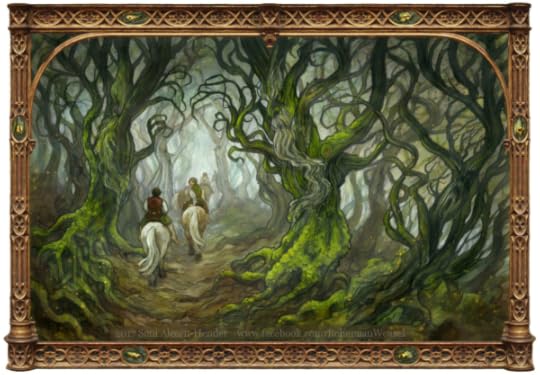

For the last generation or so, this sort of thinking has been in vogue in fantasy as well. We now have great many stories where magic is fully understood, wizardry is a common and accepted profession, and fantasy creatures and weird races walk among us; or where all that nonsense has been shunted aside in favour of gritty medieval realism. On the internet message boards - particularly Tumblr - people love to discuss magic and monsters and such things, wonder how exactly they work, seek out loopholes in their behavior and new strengths and weaknesses, or have a good laugh about what happens when their rules are applied to reality in new and ridiculous ways.
For example...

Even that last aspect, about destruction and domination, has found new life in a subgenre called HFY - short for "Humanity Fuck Yeah" - which started out as an attempt to give humans something to be special about in the face of all the aliens and monsters, rather than being the generic Normals, but which many have chosen to interpret as humanity applying their science, intellect, and combat instinct to destroy all the fantastic and weird.

It's not just a yearning to understand, really - it all works in concert with an almost-equal yearning to explain. To show off, to feel smarter than those around us. To describe in great detail how our magic systems work, how well they make sense, and how we've integrated other creatures and monsters and races into the world and how they would change things in society; or, at the opposite end, how much research we've done on the subject of medieval history, technology, sociology, heraldry, and mud. Hell, I myself am far from immune to this: I make one atypical cosmic system and ensuing seasons and weather patterns, and I now find myself wanting to talk about it in every story I write.
I think it all shows an even greater issue we as a species have: when we get an idea that's ostensibly good or beneficial or funny, we exploit the shit out of it. More often than not this results in far more trouble than its worth. We cannot do anything in moderation. As seen here: we want to make sense of stuff, and so we kill fantasy.
Well, it's a slight exaggeration. It's not to say that any such fiction could not be pretty great anyway, or that some of the internet fantasy analyzation isn't really funny and making some curious remarks - it's just that I don't think we should follow such a trend too far, as a general rule, and that we should give a new chance to not understanding everything, and to let the world's own strange logic to carry things for us.
So as I like to do things, there's a lot of magic out there, a lot of fantasy, a lot of mystery - and there's nothing you understand about it on the outset, and very little you understand even after you've had an adventure. Wizards are rare and few, considered powerful and sagacious even when they're relatively weak or ignorant by the standards of most fantasy - each as well-known as kings, and no more common, yet each has only ever glimpsed a little bit of the unknown realm of fantasy. Other races live far away from human realms, at best mysterious and detached in the borderlands where they're sometimes seen, at worst unseen and wondrous, relegated to realm of imagination and fairytale, in the inner lands. The very world, its lands and seas and skies, acts bizarrely and erratically, all too often impossible to predict or defend against, let alone control. The people who have gone to these lands of wonder and returned alive, are venerated by all.
In your little farm, village, or town, things may - indeed should - seem altogether normal and sensible, your immediate surroundings well understood to you and no longer causing you fear... but step out of your door and onto the forest path, and who knows where it will take you and what strange sights will open to you.
That, as I understand it, is Fantasy.

Published on June 20, 2019 10:07
•
Tags:
creatures, fairy-tales, fantasy, humanity, instinct, magic, magic-systems, pet-peeves, rules, science, wizards, worldbuilding
June 8, 2019
Rule Number One of Magic: There Are No Rules
Or to be perhaps a little less blunt and poetic... the rules for magic come from within, not without.
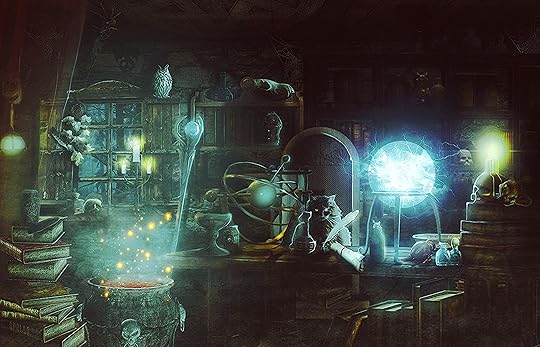
Great many fantasy writers, especially nowadays, love to develop complex magic systems, fancy and impressive and well-explained, spending a lot of time and pages to describe the way the wizard tosses the runestones or sings the song or speaks the true name or what have you. And I never saw the point in this sort of a thing: it may seem like an attractive course of action on the surface, to flesh out and expand the most magical and fantastic thing in your world, to show the reader just how things work there and how it's different from our own mundane life... but what you're really doing is, you're wasting a great deal of time and effort and the reader's attention to make your world less magical.
You're taking things that should be Unknown, and making them Known. You're turning the Magic into Science: the kind of science that's quite impossible for us in real life to do, but science nonetheless. From the narrative standpoint, what really is the difference between tapping into the energies of the Wyrd (or whatever) that exists parallel to your world and that all magic is fueled by, then wriggling your fingers the right way, snapping your thumb and forefinger to create the spark, in order to cast the Fireball spell to burn your enemies – and pulling the trigger of your flamethrower to shoot the fuel out through the burning nozzle?

There is no difference.
This was a fairly exaggerated example, many of the magic systems rarely true to such extent, but you get the point. Each fact established about magic as a whole – where the magical energy comes from, whether wizards throw down runes or play music or whatever to create effects with it, how different runes or instruments or what have you play off of one another, etc. – binds it more and more to common reality, dulls out the fantasy and wonder, makes it more logical and understandable and predictable, cages it. Magic should fly free.
So, I avoid making such generalizations to the last: I never tell how all magic everywhere works. Instead, I tell how this one guy's magic works. This has numerous advantages for me:
First, I tend to enjoy character-based stories, rather than setting-based, so this keeps the priorities in the correct order. To develop some character's inidividual magical style, is to develop the character.
Second, it maintains the sense of wonder. You may know how this guy works his magic, but you have no idea how the next guy does it: each time you meet another wizard you'll have something to look forward to.
Third, it still binds them to the narrative with personal rules and limitations. To take the above Fireball example, one wizard may cast it with a wand made out of specific kind of wood, with specific kind of runes written in it; another one might cast it by yelling out a Sick Burn. If you want to defend yourself against the former guy, or to add narrative tension about his survival, snap his wand; to do the same for the latter, gag him.
You see a demonstration of this early on in The Straggler's Mask, where two wizards take out their wands and commit to a terrible and destructive arcane duel. Their different philosophies and powers are at the forefront the entire time:

(Incidentally, I'm really not a fan of how so much of magic art is so full of flash and color and lightning and other special effects. But that's a blog post for another day.)
The old man Melker has spent all his long life in formal theoretical study of the arcane, learning his art slowly and methodically from scrolls, grimoires, and sorcerers even older and wiser than himself. A common magic system is to attribute magic to a language, but here we take this approach to the extreme: to such logical and methodical sorcerers, every individual spell is a language of their own. You don't just learn the language of magic in general. You learn the language of Fireball. And you better learn it well before starting to fling the spell around, or else you might embarrass yourself by casting something stupid, and you'll always have an accent no matter what you do. (Going with this method, Ziad Fazah would be a legendary archmage!) Melker may have only a few spells, but he's had a long time to become fluent with each of them, casting them with practiced and precise competence and surprising flexibility.
The demonic witch-girl Rime, on the other hand, has no patience for such bullshit, and instead learned her art from the lips of demons and spirits. Their whispers don't involve much about the nitty-gritty details of whatever spells they taught her, rather just how to get things done quickly and efficiently. She is consequently extremely powerful for her age, having learned a lot of things very fast... but not necessarily very well. Virtually all of her magic comes with a heavy cost, whether material or spiritual or physical, or risk doing great deal more harm to her surroundings than she'd wish it to, or involve constantly maintained pacts and complex diplomacy with summoned demons and monsters. She wields it all with relentless, burning rage – she is at a constant risk of being destroyed by things she doesn't understand, but she's going to take a chunk of the world with her.
And they are only two. You can bet that every other wizard in the setting will have their own way of doing things. None of them truly know where the magic comes from, if indeed it all comes from the same place at all – some of them have theories, beliefs, but I'll never make the mistake of telling you which one is right.
There is one constant rule, I suppose, but it's not really a rule with magic as with everything in this world or theirs: all knowledge or power worth possessing is going to take a great deal of effort, time, or other cost to acquire. If you feel that something came too easy for you, then odds are good you haven't truly acquired it, and that it's going to do you far more harm than good.


Great many fantasy writers, especially nowadays, love to develop complex magic systems, fancy and impressive and well-explained, spending a lot of time and pages to describe the way the wizard tosses the runestones or sings the song or speaks the true name or what have you. And I never saw the point in this sort of a thing: it may seem like an attractive course of action on the surface, to flesh out and expand the most magical and fantastic thing in your world, to show the reader just how things work there and how it's different from our own mundane life... but what you're really doing is, you're wasting a great deal of time and effort and the reader's attention to make your world less magical.
You're taking things that should be Unknown, and making them Known. You're turning the Magic into Science: the kind of science that's quite impossible for us in real life to do, but science nonetheless. From the narrative standpoint, what really is the difference between tapping into the energies of the Wyrd (or whatever) that exists parallel to your world and that all magic is fueled by, then wriggling your fingers the right way, snapping your thumb and forefinger to create the spark, in order to cast the Fireball spell to burn your enemies – and pulling the trigger of your flamethrower to shoot the fuel out through the burning nozzle?

There is no difference.
This was a fairly exaggerated example, many of the magic systems rarely true to such extent, but you get the point. Each fact established about magic as a whole – where the magical energy comes from, whether wizards throw down runes or play music or whatever to create effects with it, how different runes or instruments or what have you play off of one another, etc. – binds it more and more to common reality, dulls out the fantasy and wonder, makes it more logical and understandable and predictable, cages it. Magic should fly free.
So, I avoid making such generalizations to the last: I never tell how all magic everywhere works. Instead, I tell how this one guy's magic works. This has numerous advantages for me:
First, I tend to enjoy character-based stories, rather than setting-based, so this keeps the priorities in the correct order. To develop some character's inidividual magical style, is to develop the character.
Second, it maintains the sense of wonder. You may know how this guy works his magic, but you have no idea how the next guy does it: each time you meet another wizard you'll have something to look forward to.
Third, it still binds them to the narrative with personal rules and limitations. To take the above Fireball example, one wizard may cast it with a wand made out of specific kind of wood, with specific kind of runes written in it; another one might cast it by yelling out a Sick Burn. If you want to defend yourself against the former guy, or to add narrative tension about his survival, snap his wand; to do the same for the latter, gag him.
You see a demonstration of this early on in The Straggler's Mask, where two wizards take out their wands and commit to a terrible and destructive arcane duel. Their different philosophies and powers are at the forefront the entire time:

(Incidentally, I'm really not a fan of how so much of magic art is so full of flash and color and lightning and other special effects. But that's a blog post for another day.)
The old man Melker has spent all his long life in formal theoretical study of the arcane, learning his art slowly and methodically from scrolls, grimoires, and sorcerers even older and wiser than himself. A common magic system is to attribute magic to a language, but here we take this approach to the extreme: to such logical and methodical sorcerers, every individual spell is a language of their own. You don't just learn the language of magic in general. You learn the language of Fireball. And you better learn it well before starting to fling the spell around, or else you might embarrass yourself by casting something stupid, and you'll always have an accent no matter what you do. (Going with this method, Ziad Fazah would be a legendary archmage!) Melker may have only a few spells, but he's had a long time to become fluent with each of them, casting them with practiced and precise competence and surprising flexibility.
The demonic witch-girl Rime, on the other hand, has no patience for such bullshit, and instead learned her art from the lips of demons and spirits. Their whispers don't involve much about the nitty-gritty details of whatever spells they taught her, rather just how to get things done quickly and efficiently. She is consequently extremely powerful for her age, having learned a lot of things very fast... but not necessarily very well. Virtually all of her magic comes with a heavy cost, whether material or spiritual or physical, or risk doing great deal more harm to her surroundings than she'd wish it to, or involve constantly maintained pacts and complex diplomacy with summoned demons and monsters. She wields it all with relentless, burning rage – she is at a constant risk of being destroyed by things she doesn't understand, but she's going to take a chunk of the world with her.
And they are only two. You can bet that every other wizard in the setting will have their own way of doing things. None of them truly know where the magic comes from, if indeed it all comes from the same place at all – some of them have theories, beliefs, but I'll never make the mistake of telling you which one is right.
There is one constant rule, I suppose, but it's not really a rule with magic as with everything in this world or theirs: all knowledge or power worth possessing is going to take a great deal of effort, time, or other cost to acquire. If you feel that something came too easy for you, then odds are good you haven't truly acquired it, and that it's going to do you far more harm than good.

Published on June 08, 2019 16:22
•
Tags:
magic, magic-systems, melker, overdesigning, pet-peeves, rime, rules, science, wizards, worldbuilding
June 5, 2019
No Time For Downtime
It's pretty common for long-time stories, comic books, and novels, to only focus on the important and exciting bits. Their heroes never get to rest. Their suffering, and that of their loved ones, is constant. Even when they try to go on a vacation or something, take it easy, some terrible danger will threaten them and possibly the whole world. I feel like I'm falling to this trap myself.

Take Conan the Barbarian for instance. Pile together all the original stories, many decades' worth of Marvel and Dark Horse comics, and I'm pretty sure there'd be enough adventure put together to last several lifetimes. How could he pull it all off? How could he survive so much bullshit thrown his way? And what kind of a world is he living in, if it can afford to constantly threaten its greatest champion... and what would the world look like if he suddenly carked it, or didn't happen to be around to save the day one time on the other side of the world?
I feel like this tends to really wound an otherwise good setting because it makes it feel like nothing they ever do matters, and that the world is always in peril, and who would want to live there anyway if some grave threat drops down from the sky every weekend? What kind of psychological wrecks would it leave the characters, if they had to jump from one danger to another, if we never saw them relax at all? We can often assume that they get a few days off from time to time, but we can never be sure if it's never shown.
So, you know what? To hell with it all. Peal is going to get some time off. I'm going to write a story where nothing bad at all happens. Maybe even several. Poor guy really needs it. If you think The Straggler's Mask put him through the wringer, you ain't seen nothing yet.

Take Conan the Barbarian for instance. Pile together all the original stories, many decades' worth of Marvel and Dark Horse comics, and I'm pretty sure there'd be enough adventure put together to last several lifetimes. How could he pull it all off? How could he survive so much bullshit thrown his way? And what kind of a world is he living in, if it can afford to constantly threaten its greatest champion... and what would the world look like if he suddenly carked it, or didn't happen to be around to save the day one time on the other side of the world?
I feel like this tends to really wound an otherwise good setting because it makes it feel like nothing they ever do matters, and that the world is always in peril, and who would want to live there anyway if some grave threat drops down from the sky every weekend? What kind of psychological wrecks would it leave the characters, if they had to jump from one danger to another, if we never saw them relax at all? We can often assume that they get a few days off from time to time, but we can never be sure if it's never shown.
So, you know what? To hell with it all. Peal is going to get some time off. I'm going to write a story where nothing bad at all happens. Maybe even several. Poor guy really needs it. If you think The Straggler's Mask put him through the wringer, you ain't seen nothing yet.
Published on June 05, 2019 11:34
•
Tags:
break, breaks, constant-peril, downtime, hurry, tales-of-alethrion
June 2, 2019
May 30, 2019
The Umbrakin
full size

Drawn by a good friend of mine whom you can find here on twitter. Please bother him with a bunch of art commissions, he could use things to do.

Drawn by a good friend of mine whom you can find here on twitter. Please bother him with a bunch of art commissions, he could use things to do.
May 23, 2019
What's the worst book cover you've ever seen?
So I picked up Lloyd Alexander's classic story The Book of Three today, and I found its cover... striking. Enough so to make a whole blog post to rant about it, even though I'm fairly sure there's been great many discussion about this subject matter over the years. Might as well chip in with my own.
There's some pretty great art of this book lying around:
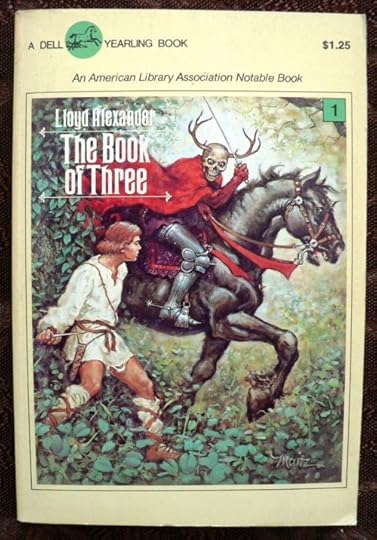



And then there's this asshole, the 80s Finnish edition I've got:
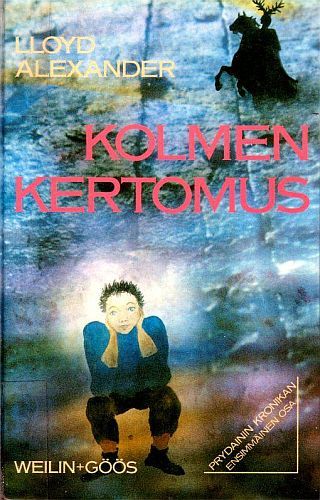
It looks a lot more like some angsty contemporary growing-up story with a whole lot of drugs and swearing. It really made me think I'd picked up the wrong book at first. I wonder what the artist, or whoever directed him to do this, were thinking while they drew this. I wonder what drove them to these artistic expressions.
But it could be even worse. At least it's got the horny guy still in the background, as the slightest indication about the book's true nature. It could be it has nothing at all.
For some reason there's this tendency I've always wondered, where book publishers tear down all of the great cover art and replace it with a bland image of some item tangentially related to the book's events, on blank background. For instance:
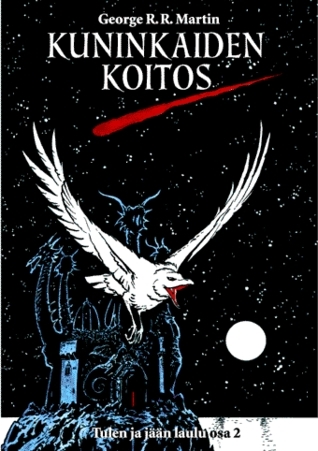
Since I spent some time dissing a Finnish cover, let's throw my countrymen a bone with an awesome cover of George R. R. Martin's book! Compare...

Or how about Harry Potter?

I'm a big fan. It's a well-drawn and evocative scene of the book, instantly draws you in and makes you want to read about what the hell's going on. And then this shit...

Why do you do this? Is it cheaper, somehow? Even though the original artwork already exists and you just need a permission to use it or something? Or is it because people are for some reason ashamed of reading anything that doesn't look all dark and gloomy and indecipherable? I don't get it.
If I ever manage to throw anything I've written at a real publisher - and I hope I will - I'm going to make a special note to put a real cover to it. I'm going to have it added to the contract and everything. I won't stand for this shit.
And if you want to show me some more terrible covers, go right ahead. I've gotten on a roll here.
There's some pretty great art of this book lying around:




And then there's this asshole, the 80s Finnish edition I've got:

It looks a lot more like some angsty contemporary growing-up story with a whole lot of drugs and swearing. It really made me think I'd picked up the wrong book at first. I wonder what the artist, or whoever directed him to do this, were thinking while they drew this. I wonder what drove them to these artistic expressions.
But it could be even worse. At least it's got the horny guy still in the background, as the slightest indication about the book's true nature. It could be it has nothing at all.
For some reason there's this tendency I've always wondered, where book publishers tear down all of the great cover art and replace it with a bland image of some item tangentially related to the book's events, on blank background. For instance:

Since I spent some time dissing a Finnish cover, let's throw my countrymen a bone with an awesome cover of George R. R. Martin's book! Compare...

Or how about Harry Potter?

I'm a big fan. It's a well-drawn and evocative scene of the book, instantly draws you in and makes you want to read about what the hell's going on. And then this shit...

Why do you do this? Is it cheaper, somehow? Even though the original artwork already exists and you just need a permission to use it or something? Or is it because people are for some reason ashamed of reading anything that doesn't look all dark and gloomy and indecipherable? I don't get it.
If I ever manage to throw anything I've written at a real publisher - and I hope I will - I'm going to make a special note to put a real cover to it. I'm going to have it added to the contract and everything. I won't stand for this shit.
And if you want to show me some more terrible covers, go right ahead. I've gotten on a roll here.
Published on May 23, 2019 13:18
•
Tags:
book-covers, chronicles-of-prydain, terrible-art
May 19, 2019
I went home the long way, by the lake, and got to pet a dog

Just a couple weeks ago we had a sudden spell of snow, but now summer is finally here. It's nice.
Published on May 19, 2019 04:22
•
Tags:
bird, find-a-dog, lake, nature, seasons, side-treks, summer, trees, weather
Pankarp
Pages fallen out of Straggler's journal, and others.
Pages fallen out of Straggler's journal, and others.
...more
- Juho Pohjalainen's profile
- 352 followers




